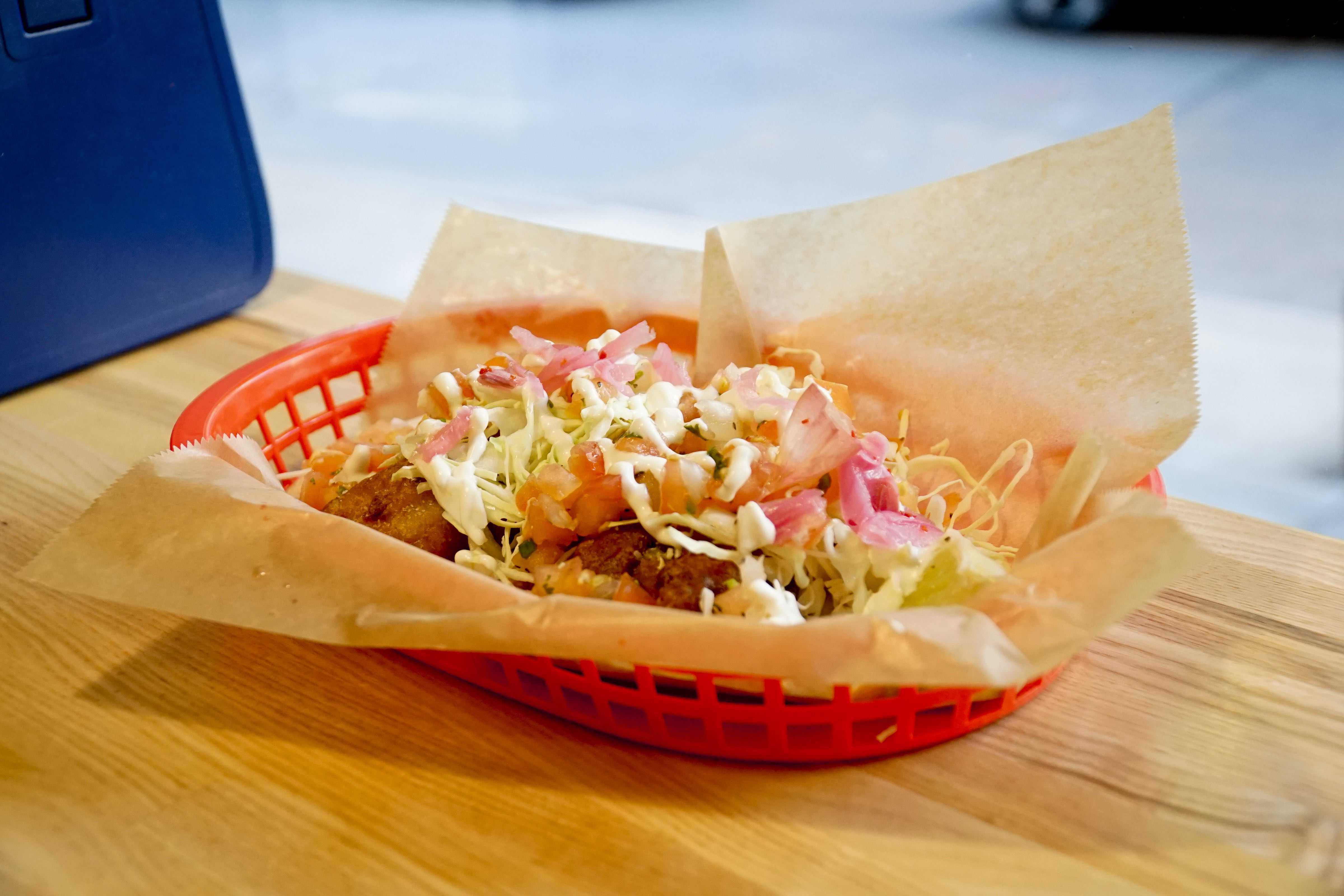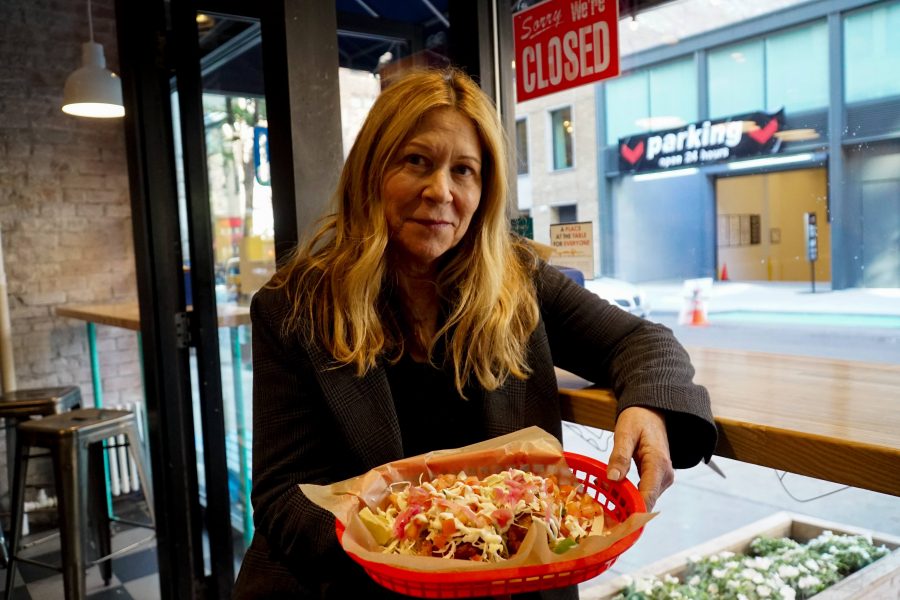Thirty-eight years ago, if you had asked Rachel and Michael Brau if they would be running a flourishing Mexican restaurant in Greenwich Village, they might have been incredulous, as they were in the thick of starting their bagel business in their longtime home, San Diego.
Rachel, 65, and Michael, 69, who come from Baltimore and a small Pennsylvania town, respectively, have spent most of their lives in San Diego. The couple moved to New York City nearly 10 years ago and opened their Mexican eatery Dorado Tacos & Quesadillas in January 2012.
The space inside Dorado is small. Its central table and the counters lining the walls allow room for maybe 20 seated customers at a given time. During the lunch rush, which lasts from about 12 to 2:30 p.m., there is a line that almost reaches the front door. Along one of the bright yellow walls hangs a framed map of the Baja peninsula and its surrounding pale blue waters. A strand of vibrant papel picado hangs in the center of the space, occasionally swaying in the breeze that comes through the door.

Behind the order counter, there is a window to the kitchen, through which you can see the bobbing, baseball-capped heads of line cooks. To the left of the counter is a drink cooler, where you can find refreshing, golden Mexican beers, and underneath sits a meticulously arranged rainbow row of Jarritos sodas.
I sit on a high stool across from Rachel at a counter-height table near Dorado’s left-hand wall.
She is dressed casually, wearing a striped long-sleeve T-shirt and supportive sneakers. Her hair is a mix of flaxen and grey strands that reach her shoulders. It is 2:30 p.m., yet the lunch rush has not dwindled, and we are surrounded by diners.
The customers at Dorado are what Rachel calls “a very eclectic mix.” Made up of students from nearby universities, tourists and nearby office workers, Dorado’s fans also include lots of neighbors. For the most part, Rachel’s eyes are fixed on me, but every so often they dart to the line and the counter, and she jumps up just as quickly with an apology to run a taco-filled basket to a customer.
“It’s very much a neighborhood place,” Rachel said after returning. “The neighbors want to see you be successful. When people come into this place, they’re coming into our restaurant.” Since Michael and Rachel are at Dorado all the time, they say the customers “really take interest, they feel taken care of.”
Tucked a few fronts away from the corner of 12th Street and University Place, Dorado Tacos has braved the storm of Mexican cuisine competition. Three weeks after Dorado opened its doors, a Mexican sit-down place, Tortaria, appeared on the corner, but it was the kind where you’d sit down and order a margarita from a waiter.
Years later, a Chipotle opened next door to Dorado but has since closed. Rachel lets out a genuine laugh and said the Chipotle opening was even funnier because their son worked for the fast food company at the time while pursuing environmental studies and sustainable agriculture. That irony was not long-lived.
“The neighbors like to say we put them out of business,” Rachel said with a smile.
I meet up with Rachel’s husband Michael later at a nearby café, Newsbar, where he greets the employees with a gregarious smile and eventually plops down in front of me with a mug of coffee and a large cookie. Donning stylish rimmed glasses and a casual blue button-down that matches his keen, watery eyes, Michael seems both energetic and at ease while he speaks.
Michael admits that Dorado’s Mexican food is less about advanced technique than combining simple flavors.
“And that was the appeal,” Michael said, “It wasn’t fine dining. I knew it.”
Nestled in a small brown paper basket, the Baja fish taco from Dorado Tacos & Quesadillas holds a dark amber strip of battered whitefish, topped with crema, pico de gallo, crunchy cabbage and pickled onion. Tucked next to the taco is a half-wedge of lime meant to be squeezed all over the shredded, piscine pile.
Tortilla chips, still oily from the fryer, fill a lined plastic basket. The guacamole is creamy and untainted: almost purely avocado without chunks of tomato. Next to it is a new salsa prepared according to a recipe the owners have been playing with: charred red tomatoes and green chilies blended to an earth-colored puree. An expected scoop of pico de gallo completes the trifecta.
The restaurant is not without criticism, however. As a white couple preparing Mexican food, Rachel and Michael have received a few negative remarks.
“We never have claimed to be authentic,” Rachel said. “We have an Americanized version of the Mexican street food, fish tacos… [Michael and I are] not Mexican. We’re making our version of Mexican food.”
To Michael, cultural appropriation, especially in the realm of food, has not been an issue he feels has hindered Dorado in terms of customer feedback.
“There’s always someone on Yelp who makes some kind of comment,” Michael said. “But no, that hasn’t been an issue. In America, we adopt things […] America appropriates other peoples’ cuisine. We fuse… that’s what we do.”
After all, the fish taco did not exist in the Baja city of Ensenada until around the 1940s. Before World War II, many Japanese fishermen sailed to Baja in search of cool, bountiful waters, and subsequently introduced the local Mexican population to tempura-battered and fried fish. The technique was then picked up and applied to make the fish taco as we know it today.
Gustavo Arellano, a Mexican American food historian who was a publisher and editor of OC Weekly and currently pens the column ¡Ask a Mexican!, ruminated on this same issue.
“No one rips off food like Mexicans,” Arellano wrote in one article. “The Mexican restaurant world is a delicious defense of cultural appropriation […] Mexicans didn’t care much for Spanish dessert breads, so we ripped off most pan dulces from the French (not to mention waltzes and mariachi). We didn’t care much for wine, so we embraced the beers that German, Czech and Polish immigrants brought to Mexico. And what is al pastor if not Mexicans taking shawarma from the Lebanese, adding pork and making it something as quintessentially Mexican as a corrupt PRI?”
Dorado was not Michael and Rachel’s first business. Michael had lived in La Jolla, San Diego for about five years when he had his first food business idea to introduce bagels to the West Coast. At this point in the 1980s, Jews could live in La Jolla — unlike in past decades — but that was a recent development. Their new inclusion in this fancier part of the city had allowed it to become even more cosmopolitan, but there was still something missing.
“I saw that there were no bagel places and I saw an opportunity,” Michael said.
Michael went to Baltimore, where he visited Jewish family members in his childhood and ate many delicatessen delicacies — including bagels — to quickly learn the trade. Along with Rachel, he opened The Baltimore Bagel Co.
“It was a home run from the day we opened,” Michael said.
The Braus’ place became so popular in the area that their bagels got onto Air Force One when the president was in town. By the time a 1992 Los Angeles Times article outlining the bagel company’s expansion to Orange County came out, The Baltimore Bagel Co. was selling 21,000 bagels a day in San Diego County.
Years later, after selling the bagel company’s 15 locations, the Braus were doing business consultation and fell in with Douglas Organ, a chef who became their partner, and who had recently been experimenting with fish tacos in Boston.
“All anybody wanted [was] the fish tacos,” Rachel said. Organ contacted Michael about a concept centered around the fish taco, knowing the Braus had successfully run a big food business.
The three opened Dorado’s first location in Boston, and Michael commuted from New York for the first year it was open, spending half of his time in each city. They then opened a location in New York, originally intending to open several locations in each city. But finding locations was difficult, and after a while, the couple and the chef parted ways — Organ took the Boston location, and Michael and Rachel took the New York City one.
“There was the idea of ‘oh, let’s bring fish tacos to the East Coast just like we brought bagels to the West Coast,’” Rachel said. “Not that they’d never heard of bagels, but they certainly didn’t have any good ones.” With that urge to share bi-coastal culture, the appeal of more Mexican food arriving in Manhattan was immense.
Once their plan was set in motion, the three partners — Organ, Michael and Rachel — traveled to Ensenada to find inspiration for their recipes.
“Ensenada is a fish town, and on every corner, there are little kiosks run by women selling fish tacos,” Rachel said. “We saw how they did it, and how they seasoned it, and that sort of gave us some ideas.”
Since becoming independent and opening their NYC location, the Braus have tweaked a lot of the recipes to improve their flavor and bring them closer to their memories of San Diego’s Mexican food.
While Rachel doesn’t cook, Michael, along with their three sons — aged 35, 32 and 28, all of whom live in Brooklyn — do most of the cooking.
“I’ve always done the cooking in my family,” Michael said. “I always had a passion for food, and my kids are this way. I would go to Asian markets and buy food [and] ingredients. I was never afraid of a recipe; I was very confident. I was the head of a fine dining [company] and I learned a lot in the kitchen there.”
At the moment, Rachel and Michael are busier than ever because last March, Dorado opened a Midtown location in the Urbanspace Lexington food hall.
Michael does admit that there is always someone who takes issue with their take on Mexican food. “And that’s ok,” he says. Both Big Apple locations have been very successful, and the Braus are always busy, but the hard work pays off.
“Someone sent me a message last week through our POS [point of sale] and they said, ‘This was the best meal I had in my two days in New York,’” Michael said. “And that makes you feel good.”
Email Georgie Galinson at [email protected].


























































































































































